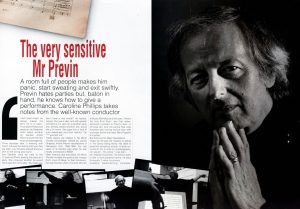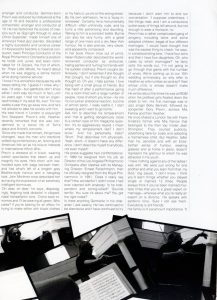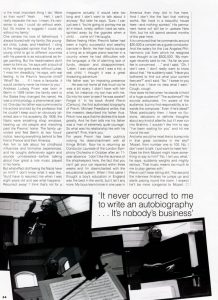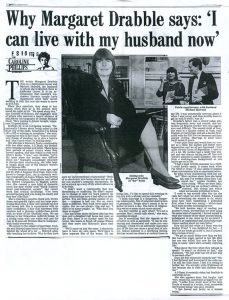Take three debutantes
Evening Standard | 13 Apr 1992
Melia Belli is a self confessed feminist. She went to a state (‘public’) school in San Francisco and later got four A levels. She’s also vegetarian, teetotal and American. She wants to be a lawyer and is travelling in the Himalayas this summer before going to Glasgow University. Not your stereotypical debutante, in other words.
View transcriptMelia Belli is a self confessed feminist. She went to a state (‘public’) school in San Francisco and later got four A levels. She’s also vegetarian, teetotal and American. She wants to be a lawyer and is travelling in the Himalayas this summer before going to Glasgow University. Not your stereotypical debutante, in other words.
A worldly and friendly 19-year-old, she is mini-skirted, with a fake fur jacket and a self-assured air. Her mother, like those of all good debs, sits protectively nearby. ‘I think it’s a good idea to learn how to walk gracefully,’ says Melia, in her transatlantic accent. ‘I’ve been practising turns and sticking my tummy and bum in.’ (When we spoke after the Berkeley Dress Show, she was glad it was over. ‘They should give you knee pads, we were so nervous.’
She’s not the type of gel to measure her life in party invitations. So what is her view of the traditional debutante accomplishments, like wine-tasting and setting tables? ‘Well, I don’t drink and I don’t usually eat at tables. I haven’t done that for a while and the last time I did, I couldn’t quite remember where everything went. I normally eat around the kitchen, and I tend to eat in my car a lot.’
So far her impression of the other debs has been positive. ‘These girls seem pretty nice and not snobby or upper-class. To a certain extent debs are driven and know what they want,’ she says, seemingly describing herself. ‘They are elegant and maybe even opinionated and headstrong.’ And does she follow the instincts of deb mothers to seek out The Right Sort of people? ‘Not at all. I choose my own friends. If there are people here I’d like to associate with, then I will.’
She thinks the debutantes reflect women across society now. ‘Nobody is looking for a husband. We are young women, not girls any more. We are making our own choices. Most of us have decided we want to go on and have a career, to make it by ourselves and then find a husband. I don’t think we are doing this just to find men.’
Her mother, who did the Season in the States and would have been disappointed had Melia decided not to follow her, introduced her to the idea of being a debutante. ‘My father doesn’t think much of it.’ The child of a broken marriage, Melia is an only child and currently lives in San Francisco. Her mother studies business at Oxford University and her father, a lawyer, lives in the States.
She hasn’t been told much about the Season, so she doesn’t know what to expect. ‘It should be quite different from America where it was much more frivolous and didn’t have a social cause,’ she says. ‘It’s a bit archaic there.’ No problem with dancing through the recession then? ‘No, because of the events will raise money for charity.’ And she doesn’t plan to buy any new clothes.
So is she keen to meet the Debs’ Delights? ‘English men are quite different from American ones. I’ve had quite a few English boyfriends and they are nice. They’re a lot politer. You don’t get many Americans opening doors for you or paying for your dinner.’
She looks forward to the pinnacle of the Season, Queen Charlotte’s ball, when the lissome gels in white gowns curtsy to a birthday cake. ‘It seems like it should be fun. I don’t have a problem with curtsying to a cake if that’s what’s done. It’s not like bowing to an idol or sacred cow.’ She doesn’t plan to take it at all seriously. ‘At the end of the Season, I would like to have established some friendships. I’d like it to have been an experience. And I’d like to have learned to waltz.’
CAMILLA’S STORY THE Hon Camilla Astor is a reluctant debutante. One feels that she has been forced into it, although she would never say so. Her social aspirations don’t run in the direction of the Season: she’d rather be riding or taking photos. She also prefers to dress scruffily. She even dislikes the snotty name ‘debutante’. What would she rename these party girls? ‘The Social Gatherers’.
We’re talking in the Berkeley Hotel, and this is the only interview of a, er, Social Gatherer without her mother. ‘I think it’s very amusing. All the mums absolutely adore showing off their daughters,’ she says later, talking about the mothers’ lunches. ‘My mum thinks it’s quite funny too.’ Camilla has a beautiful, sometimes wistful, face and a diffident air. She is also delightful and genuine. ‘I normally wear jeans,’ she says, quietly spoken, frowning and fiddling nervously with her ring. Today she’s wearing a smart red jacket and a black chiffon mini.
Camilla is at St George’s, Ascot, doing her A-levels, so her social life ‘isn’t that good’. She thinks the heady round of cocktail parties and summer balls will be about meeting lots of people. (Her grandmother, Irene Haig, daughter of Lord Haig, did the Season.) Does she like parties? ‘I do,’ she says, sounding unsure. ‘But it was my father’s idea that I should do this. I’m not sure why.’ Why is she so unconvinced? ‘I think it’s purely because I’m shy.’
She’s the 17-year-old daughter of Lord Astor of Hever, whose father was proprietor of The Times. ‘I don’t really think I have a class. I don’t like to position myself, anyway.’ But technically she is an aristocrat. ‘I suppose I am. But it’s quite pompous thinking that way. I don’t use ‘the Hon’ if I can help it. I just stay ‘Camilla’. Dad’s just like me, he doesn’t use his title unless he has to, which is nice.’
Some estimate that the Season costs up to £30,000 a head. Does Camilla think it’s necessary to be rich? ‘Oh gosh no, not at all. I haven’t spent any money at all on it.’ So does she think the Season elitist? ‘I suppose it is, yes, oh God, I don’t know how to answer this. The answer is also ‘no’ because there are so many people doing it that you get a good variety.’ Certainly, rather than just being aristocrats, there are now meritocrats and non-Brits on the social list. But no Sharons and Kevins. ‘I enjoy meeting a broader mix,’ says Camilla, who says she’s led a sheltered life. ‘But it is quite nice meeting people you will probably be around for the rest of your life.’ So far she has greatly enjoyed the debs she has met. ‘People have expected us to be bitchy and catty, but we have been laughing a lot and having fun. It’s been really relaxed.’
We talk about her expectations. Is she looking forward to Royal Ascot and the Henley Royal Regatta? ‘None of it has struck me as particularly wonderful. I probably wouldn’t go out of my way to do things like that.’ What would she rather do by choice? ‘Go on holiday.’ She will, however, host a party during the Season. She thinks her father is planning a bash for her 18th birthday. ‘But it might be quite a disaster because it’ll be in Kent.’ And boys? She had a boyfriend until two months ago. She went out with him for four months. (She says she’d like to get married and have children, ‘eventually’.) Would she like to come out of the Season having met a new man? ‘Oh gosh, no, not at all.’ On being offered the option, she says: ‘I’d rather go out with a pop star than a Hooray Henry, that would be more exciting.’ What does she think the debs’ delights will be like? ‘I suppose they’ll be what you expect of a man – good-looking and charming.’ In conclusion, she rather fears how people will regard her now that she’s a debutante. ‘I don’t want to give the wrong impression. I don’t want to be seen as really snobbish.’
ELISABETH’S STORY Elisabeth Dermot-Walsh, 17, is keen as mustard about being a debutante. She sits like an anchorwoman and talks like a professional, with her hands placed just so on her knees. She’s self-possessed and exuberant, sophisticated and immaculate. ‘Cross your legs the other way,’ says her mother. ‘It’s always better to cross your legs upstage than downstage.’ It’s all, in Elisabeth’s words, such fun.
Elisabeth is at West Heath school, as was Princess Diana. ‘I want to go to university, ideally to Cambridge,’ she says, in slightly clipped upper-class tones. Her father was ‘a Rank movie star in the Fifties’, and she is quite tempted to launch herself into showbiz after university. She also thinks it would be ‘an honour’ to be named Deb of the Year.
It isn’t necessary, she says, to be wealthy to do the Season. ‘That’s not important. You don’t have to go out and buy new clothes or anything because the clothes you’ve got are perfectly adequate. A lot of the events are for charities, so you aren’t spending money as much as giving it.’ She enjoys parties. ‘Well, yes, who doesn’t? I’m not a party animal or anything. But it’s such fun.’ Before the Season began, her diary was filled with charity balls, dinner parties and King’s Road shopping trips. She sees the next few months as an exciting time. She enthuses about helping the NSPCC and Queen Charlotte’s charities, and is junior chairman for the latter’s ball. ‘If I want to raise money for charity one day, I’ll have benefited from the experience.’
She also feels positive about widening her social sphere. ‘Being at boarding school, you don’t meet so many people.’ She’s keener on meeting girls, but says she doesn’t know many boys. ‘I haven’t ever had a boyfriend. I meet boys at things like parties. But I don’t want to launch myself at the world of boyfriends yet.’ Is she looking for a husband? She laughs. ‘I haven’t met any of the chaps, but I’ve got to go through university and live my life a bit.’
The delightful thing is that she’s going to meet ‘like-minded people’; when she leaves school, she can do social things with them, such fun. ‘Probably for the rest of your life you’re going to go to Ascot and things. So it is such fun to do it as a beginner with lots of other people who are beginners.’ She has found the other girls jolly friendly and uncompetitive. ‘We were bought up to be nice to each other. It’s very jolly.’ Her own party will be unusual. ‘You’re always starving, after balls. The first thing you think of is food. So after Queen Charlotte’s I thought I’d have a breakfast party for everyone to toast my birthday in champagne . . .’
‘Just the girls who curtsey to the cake,’ corrects her mother. ‘. . . and orange juice,’ she resumes. ‘At four in the morning.’
She doesn’t think the Season will change her. ‘I don’t think I’ll be a different personality at the end. My spectrum of experience will have increased and I’ll have grown up, which I would have done anyway. I have a joie de vivre and enthusiasm. I’m looking forward to it tremendously. I just can’t wait to get on with life. I am at a very happy moment of my life.’






